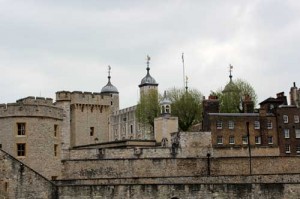
Following his arrest two days earlier, Thomas Cromwell wrote to Henry VIII on 12th June 1540, from his prison in the Tower of London, asking for mercy and pleading his innocence.
Here is his letter:
Prostrate at your Majesty’s feet, I have heard your pleasure by your Controller, viz., that I should write such things as I thought meet concerning my most miserable state. And where I have been accused of treason, I never in all my life thought to displease your Majesty; much less to do or say “that thing which of itself is so high and abominable offence.” Your Grace knows my accusers, God forgive them. If it were in my power to make you live for ever, God knows I would; or to make you so rich that you should enrich all men, or so powerful that all the world should obey you. For your Majesty has been most bountiful to me, and more like a father than a master. I ask you mercy where I have offended. Never spoke with the Chancellor of the Augmentations and Frogmerton together at a time; but if I did, I never spoke of any such matter. Your Grace knows what manner of man Throgmerton has ever been towards you and your proceedings. What Master Chancellor has been to me, God and he know best; what I have been to him your Majesty knows. If I had obeyed your often most gracious counsels it would not have been with me as now it is. But I have committed my soul to God, my body and goods to your pleasure. As for the Commonwealth, I have done my best, and no one can justly accuse me of having done wrong wilfully. If I heard of any combinations or offenders against the laws, I have for the most part (though not as I should have done) revealed and caused them to be punished. But I have meddled in so many matters, I cannot answer all.
The Controller showed me that you complained that within these 14 days I had revealed a matter of great secrecy. I remember the matter, but I never revealed it. After your Grace had spoken to me in your chamber of the things you misliked in the Queen, I told you she often desired to speak with me, but I durst not, and you thought I might do much good by going to her and telling her my mind. Lacking opportunity I spoke with her lord Chamberlain, for which I ask your mercy, to induce her to behave pleasantly towards you. I repeated the suggestion, when the lord Chamberlain and others of her council came to me at Westminster for licence for the departure of the strange maidens. This was before your Grace committed the secret matter to me, which I never disclosed to any but my lord Admiral, by your commandment on Sunday last; whom I found equally willing to seek a remedy for your comfort, saying he would spend the best blood in his belly for that object.
Was also accused at his examination of retaining contrary to the laws. Denies that he ever retained any except his household servants, but it was against his will. Was so besought by persons who said they were his friends that he received their children and friends—not as retainers, for their fathers and parents did find them; but if he have offended, desires pardon. Acknowledges himself a miserable sinner towards God and the King, but never wilfully. Desires prosperity for the King and Prince. “Written with the quaking hand and most sorrowful heart of your most sorrowful subject, and most humble servant and prisoner, this Saturday at your [Tower] of London.
Also on this day in history…
- 1530 – Catherine of Aragon told Henry VIII to abandon his “wicked” life.
- 1535 – Richard Rich interviewed Sir Thomas More in the Tower of London. He later reported, at More’s trial, that More had denied the royal supremacy during this interview.
- 1553 – Edward VI’s council commanded the judges of the King’s Bench to turn Edward’s “Devise for the succession” into a legal will.
Notes and Sources
- LP xv. 776